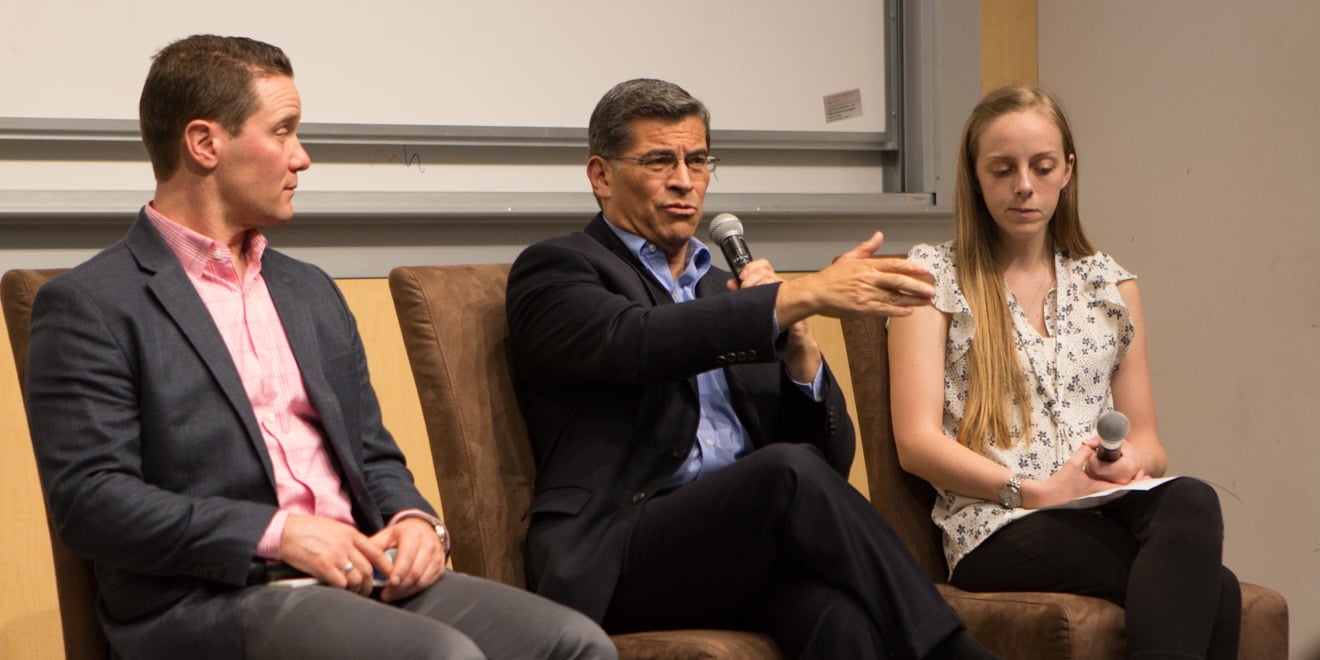Dubbed the Golden State Warrior for a series of high-profile challenges to the White House, California Attorney-General Xavier Becerra ’80 JD ’84 struck a confident tone on the state’s policies under the Trump administration at a Wednesday evening event hosted by Stanford in Government (SIG).
“You build a wall, I’ll buy a ladder,” said Becerra, referring to the anti-immigrant border wall proposed by the White House. “Why would I spend $20 to $40 billion to build a wall, when we learned that technology thousands of years ago?”
Organized by SIG alongside several co-sponsors, the event began with a brief prepared speech from Becerra, followed by a discussion moderated by SIG chair Alexis Kallen ’18 and sociology professor Tomas Jimenez. A question-and-answer session with the audience concluded the hour-long event, during which audience members raised questions about a range of issues such as DACA, healthcare legislation and racial discrimination in law enforcement.
Throughout the evening, Becerra connected his progressive politics to his personal roots.
“I don’t need to talk about where I want to take this state as Attorney-General,” said Becerra. “All I have to do is take a look at where I come from, and you can say quite a lot about where I want to go.”
Becerra explained that his status as a first-generation college student with immigrant parents informed his thinking about the importance of offering equal opportunities – especially regarding access to quality education – to historically less well-off communities, from undocumented immigrants to people of color.
Replying to an audience question on reducing incarceration rates for young people of color, Becerra said, “Make sure those people have the chance to go to a good kindergarten and have the chance to keep going from there.”
On the future of California and the U.S. under Trump, Becerra also emphasized the importance of the country’s historical foundation – its Constitution.
“At the end of the day, we’re a nation of law, not of a particular man,” Becerra said.
When Jimenez raised the question of California’s popular opinion shift on immigration since its overwhelming support of Proposition 187 in 1994, Becerra suggested that the state was going through a cyclical shift in political attitudes, much like the rest of the U.S. is today. However, he highlighted the strength of both the country’s and state’s legal institutions in preventing anti-immigrant sentiment from influencing the law, even in the 1990s.
“But for the courts, our institutions, we would have had a law in the state of California that would have denied [immigrant] kids that kindergarten,” Becerra said.
Audience member Francesca Lupia ’19 said that Becerra’s focus on the economic argument for supporting immigration to the U.S. forced them to rethink their view of immigration as a primarily ethical question.
“[I believe] that keeping families together and giving people fleeing instability and discrimination the opportunity to come to the United States goes beyond the person’s ability to contribute to the economy,” Lupia said. “But I also realized I can’t close my eyes and not think that economic factors aren’t a big part of both the pro- and anti-immigrant views.”
According to Sam Feineh ’19, director special events at SIG, Becerra first approached SIG about a possible event at Stanford following a history of collaboration with the group, including a SIG-run summer fellowship that sponsored a student internship in Becerra’s office while he served in the House of Representatives.
Stanford loomed large in Becerra’s discussion of his educational roots. He attended Stanford both for his undergraduate degree in economics and for law school. Two of his three daughters also completed their bachelor’s degrees at Stanford.
“I thought I was middle class growing up as a kid — until I drove to Palo Alto,” Becerra quipped.
But Becerra urged students from communities that are underrepresented in professional careers like law to be optimistic above all else.
“I shouldn’t be sitting here today as an Attorney-General, and by God let’s finally get rid of this ‘first Latino’ or ‘first person of color’ to do this or that,” Becerra said, responding to a student who sought advice for students of color seeking higher office. “My mother could have done this job without thinking too hard. So could my father, if he had the chance to get beyond sixth grade.”
“I’m not supposed to be here, but I survived, and I’m going to win my election in 2018, and I’m going to have fun,” Becerra added to applause from the audience.
Contact Fangzhou Liu at fzliu96 ‘at’ stanford.edu.
